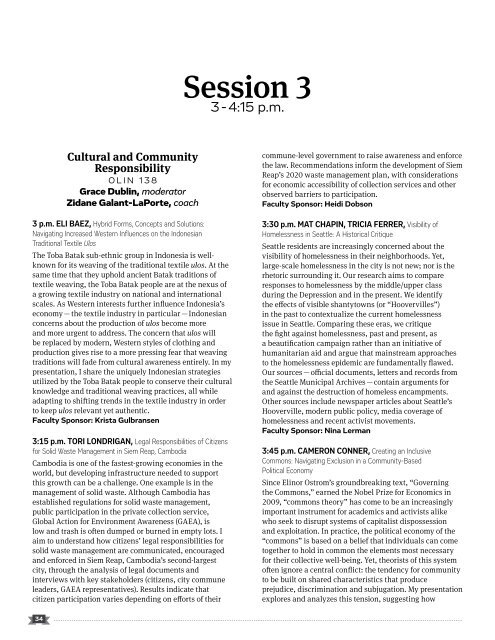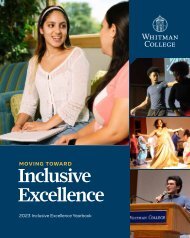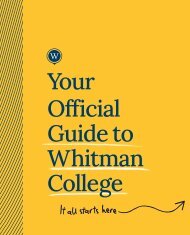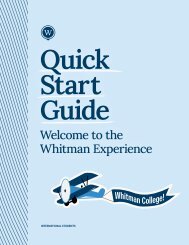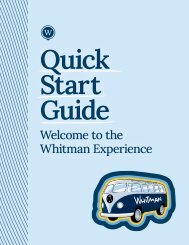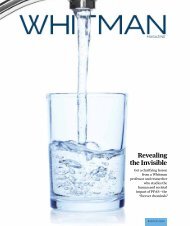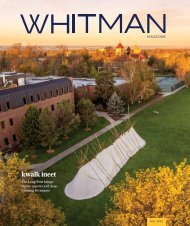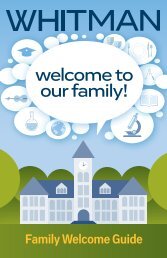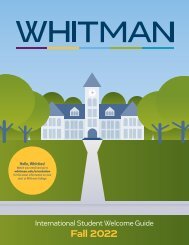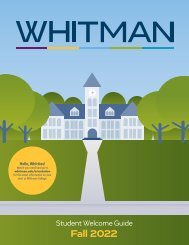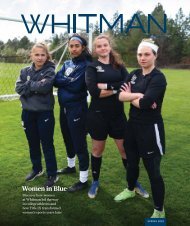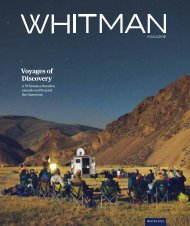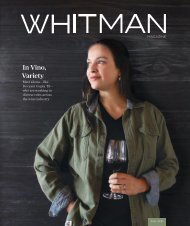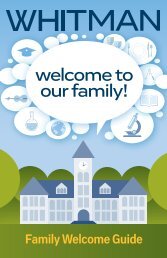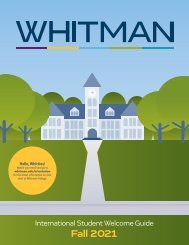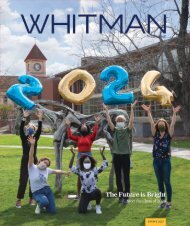Whitman College Undergraduate Conference Program 2020
Whitman College 2020 Undergraduate Conference Program
Whitman College 2020 Undergraduate Conference Program
You also want an ePaper? Increase the reach of your titles
YUMPU automatically turns print PDFs into web optimized ePapers that Google loves.
Session 3<br />
3 - 4:15 p.m.<br />
Cultural and Community<br />
Responsibility<br />
OLIN 138<br />
Grace Dublin, moderator<br />
Zidane Galant-LaPorte, coach<br />
3 p.m. ELI BAEZ, Hybrid Forms, Concepts and Solutions:<br />
Navigating Increased Western Influences on the Indonesian<br />
Traditional Textile Ulos<br />
The Toba Batak sub-ethnic group in Indonesia is wellknown<br />
for its weaving of the traditional textile ulos. At the<br />
same time that they uphold ancient Batak traditions of<br />
textile weaving, the Toba Batak people are at the nexus of<br />
a growing textile industry on national and international<br />
scales. As Western interests further influence Indonesia’s<br />
economy — the textile industry in particular — Indonesian<br />
concerns about the production of ulos become more<br />
and more urgent to address. The concern that ulos will<br />
be replaced by modern, Western styles of clothing and<br />
production gives rise to a more pressing fear that weaving<br />
traditions will fade from cultural awareness entirely. In my<br />
presentation, I share the uniquely Indonesian strategies<br />
utilized by the Toba Batak people to conserve their cultural<br />
knowledge and traditional weaving practices, all while<br />
adapting to shifting trends in the textile industry in order<br />
to keep ulos relevant yet authentic.<br />
Faculty Sponsor: Krista Gulbransen<br />
3:15 p.m. TORI LONDRIGAN, Legal Responsibilities of Citizens<br />
for Solid Waste Management in Siem Reap, Cambodia<br />
Cambodia is one of the fastest-growing economies in the<br />
world, but developing infrastructure needed to support<br />
this growth can be a challenge. One example is in the<br />
management of solid waste. Although Cambodia has<br />
established regulations for solid waste management,<br />
public participation in the private collection service,<br />
Global Action for Environment Awareness (GAEA), is<br />
low and trash is often dumped or burned in empty lots. I<br />
aim to understand how citizens’ legal responsibilities for<br />
solid waste management are communicated, encouraged<br />
and enforced in Siem Reap, Cambodia’s second-largest<br />
city, through the analysis of legal documents and<br />
interviews with key stakeholders (citizens, city commune<br />
leaders, GAEA representatives). Results indicate that<br />
citizen participation varies depending on efforts of their<br />
commune-level government to raise awareness and enforce<br />
the law. Recommendations inform the development of Siem<br />
Reap’s <strong>2020</strong> waste management plan, with considerations<br />
for economic accessibility of collection services and other<br />
observed barriers to participation.<br />
Faculty Sponsor: Heidi Dobson<br />
3:30 p.m. MAT CHAPIN, TRICIA FERRER, Visibility of<br />
Homelessness in Seattle: A Historical Critique<br />
Seattle residents are increasingly concerned about the<br />
visibility of homelessness in their neighborhoods. Yet,<br />
large-scale homelessness in the city is not new; nor is the<br />
rhetoric surrounding it. Our research aims to compare<br />
responses to homelessness by the middle/upper class<br />
during the Depression and in the present. We identify<br />
the effects of visible shantytowns (or “Hoovervilles”)<br />
in the past to contextualize the current homelessness<br />
issue in Seattle. Comparing these eras, we critique<br />
the fight against homelessness, past and present, as<br />
a beautification campaign rather than an initiative of<br />
humanitarian aid and argue that mainstream approaches<br />
to the homelessness epidemic are fundamentally flawed.<br />
Our sources — official documents, letters and records from<br />
the Seattle Municipal Archives — contain arguments for<br />
and against the destruction of homeless encampments.<br />
Other sources include newspaper articles about Seattle’s<br />
Hooverville, modern public policy, media coverage of<br />
homelessness and recent activist movements.<br />
Faculty Sponsor: Nina Lerman<br />
3:45 p.m. CAMERON CONNER, Creating an Inclusive<br />
Commons: Navigating Exclusion in a Community-Based<br />
Political Economy<br />
Since Elinor Ostrom’s groundbreaking text, “Governing<br />
the Commons,” earned the Nobel Prize for Economics in<br />
2009, “commons theory” has come to be an increasingly<br />
important instrument for academics and activists alike<br />
who seek to disrupt systems of capitalist dispossession<br />
and exploitation. In practice, the political economy of the<br />
“commons” is based on a belief that individuals can come<br />
together to hold in common the elements most necessary<br />
for their collective well-being. Yet, theorists of this system<br />
often ignore a central conflict: the tendency for community<br />
to be built on shared characteristics that produce<br />
prejudice, discrimination and subjugation. My presentation<br />
explores and analyzes this tension, suggesting how<br />
34 35


